Урок. Англійська мова. "Lexics: Character. Good and bad characteristics. Grammar: Present Simple Tense. "
Матеріал на тему "Характер. Позитивні та негативні риси характеру." Граматика включає найперший найпростіший час - теперішній звичайний. Урок для учнів старшої школи, на повторення лексики після канікул. Допомагає розговорити учнів та "включити" їх у навчальний процес.
LESSON 4 Your personal vocabularyYour personal vocabulary of the lesson:of the lesson:
Lexics: Character. Good and bad characteristics. Grammar: Present Simple Tense.
|
AffIrmatIve |
Negative |
Interrogative |
|
|
Long form |
Short form |
||
|
I talk You talk He talks She talks It talks We talk You talk They talk |
I do not talk You do not talk He does not talk She does not talk It does not talk We do not talk You do not talk They do not talk |
I don’t talk You don’t talk He doesn’t talk She doesn’t talk It doesn’t talk We don’t talk You don’t talk They don’t talk |
Do I talk? Do you talk? Does he talk? Does she talk? Does it talk? Do we talk? Do you talk? Do they talk? |
We use the present simple for permanent states or habital actions.
Spelling
![]() verbs endIng In -ss, -
sh, —ch, —x, -o → -
es I watch – he watches verbs ending in consonant + y →
verbs endIng In -ss, -
sh, —ch, —x, -o → -
es I watch – he watches verbs ending in consonant + y → -y - ies
I study – he studies
BUT I buy – he buys
|
Ti |
me expressions used with the present simple: |
||
|
every day in the afternoon often |
every morning in the evening never |
every year always rarely |
at night usually sometimes etc. |
Questions and short answers
|
Questions |
Short answers |
|
Do I/we/you/they like cherries? |
Yes, I/we/you/they do. No, I/we/you/they don’t. |
|
Does he/she/it like cherries? |
Yes, he/she/it does. / No, he/she/it doesn’t. |
|
Adverbs of frequency |
|
Adverbs of frequency (often always, usually, sometimes, rarely/seldom, never, etc. are placed before main verbs but after auxiliary / modal verbs (be, hate, can, will, must, shall, etc.) He often goes to the theatre. He is never late. Tonia doesn’t usually go to bed late. |
Exercise 1 Your personal vocabulary of the lesson:
Write the verbs in the third person singular.
|
1. I miss - he ______misses_____ 2. I buy - she __________________ 3. I carry - he __________________ 4. I fix - he __________________ 5. I watch - she_________________ |
6. I call- he__________________ 7. I go - he__________________ 8. I dry - she ________________ 9. I play - he_________________ 10. I see - he _________________ |
Exercise 2
Put the verbs in brackets into the present simple.
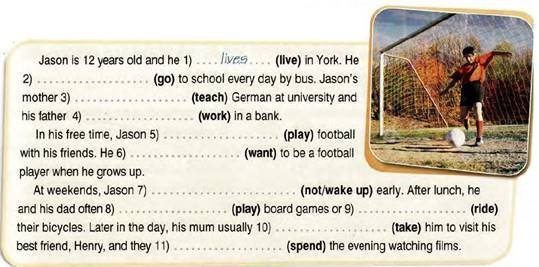
 Exercise 3
Exercise 3
Put the verbs in brackets into the present simple.
1. A: What ____does_____ (Peter/do)?
B: He ___________ (work) as a computer technician for LT & Company.
2. A: ___________ (your brother/exercise)?
B: Yes. He ___________ (go) jogging three times a week.
3. A: What time ___________ (the play/start)? B: At 6 o'clock. We need to hurry!
4. A: How long ___________ (koalas/live)?
B: They ___________ (live) for about 15 years.
5. A: My dad ___________ (not/like) working out in the gym.
B: Really? Mine ___________ (love) weightlifting and using the pool.
Exercise 4
Complete the sentences in order to make the statements true. Use don't / doesn't where necessary. Compare with your partner.
1. Rain ____falls__ (fall) from clouds.
2. Kangaroos___________ (live) in Germany. 3. Yoghurt ___________ (come) from plants.
4. Water ___________ (boil) at 100 C.
5. Sheep ___________ (eat) grass.
6. Tomatoes ___________ (grow) on trees.
7. Cows ___________ (lay) eggs.
8. Plants ___________ (need) water to grow.
Exercise 5 Your Your personal vocabulary of the lesson:of the lesson: personal vocabulary
Put the adverbs of frequency in the correct place in the sentences.
1. Mark goes fishing with his grandfather. (rarely) Mark rarely goes fishing with his grandfather
2. I don't play basketball at weekends. (always)
___________________________________
3. Does Fred help his mother with the housework? (often)
___________________________________
4. Ivan is at work on time. (never)
___________________________________
5. Does Layla read books in her free time? (usually)
___________________________________
6. I meet my friends at the shopping centre.(sometimes)
___________________________________
7. Sophie is at home on Sunday mornings. (always)
___________________________________
8. They go to the theatre. (seldom)
___________________________________
Exercise 6
Tick (✓) the right in the box
1. She ✓ is __ late __ for work. (never)
2. Diego __ eats __ meat. (usually)
3. You __ can__ see__ foxes in this forest (sometimes)
4.
![]() Does__ Tim__ go __ to school by bus? (usually)
Does__ Tim__ go __ to school by bus? (usually)
5. We __ spend __ the summer __ in France. (always)
6. Tom and James __ are __ very busy on Mondays __ . (often)
7. My dog__ is __ angry__ . (rarely)
8. Alice __ doesn’t__ go __ swimming. (often)
Exercise 7
Complete the text with the correct form of the verbs in the list
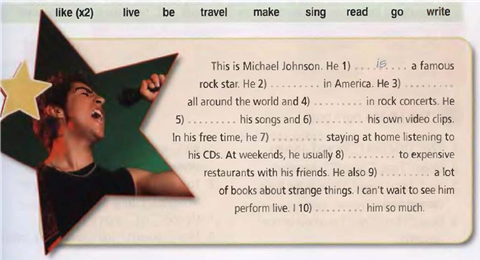
Exercise 8
Complete the interview with the correct form of the verbs in brackets.
Interviewer: So what (you/do) __do you do__ in your free time, Darina?
Darina: It depends: I sometimes (go) __________ to the beach in the morning and relax. But I (not/usually stay) __________ there long because it (be) to hot.
Your personal vocabulary
Interviewer: What (you/do) __________ in the afternoon? Your personal vocabularyof the lesson: of the lesson:
Darina: I usually (visit) __________ my friend Ray. He (have) __________ a boat and we go sailing. The Caribbean’s a fantastic place for sailing.
Interviewer: And after that?
Darina: We often (go) __________ for a drink in a bar. One of my friends (play) __________ the guitar. It’s great fun.
Interviewer: (you /stay) __________ out late?
Darina: No, we (not/stay) __________ out late because I start work early in the morning so I (like) __________ to go home around ten o’clock and
(watch) __________ a film on video before I go to bed. I (not/do) __________ a lot in the week. Interviewer: Thanks.
 Exercise 9
Exercise 9
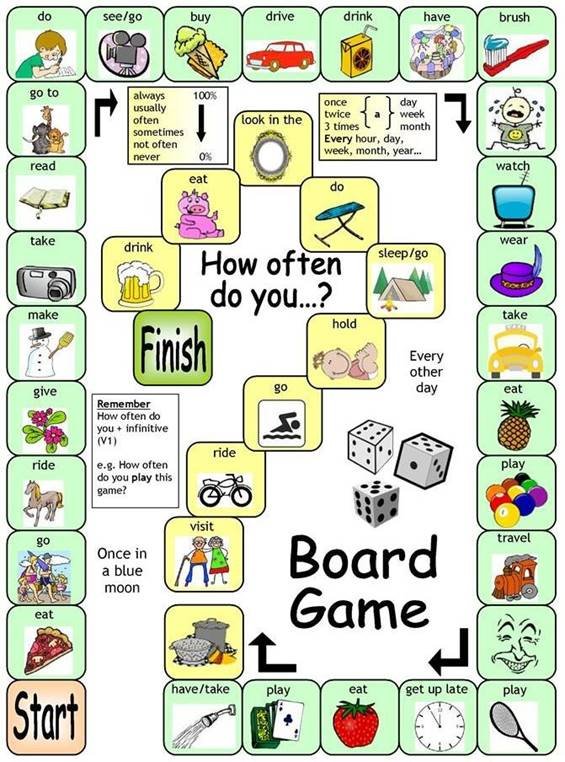
 |
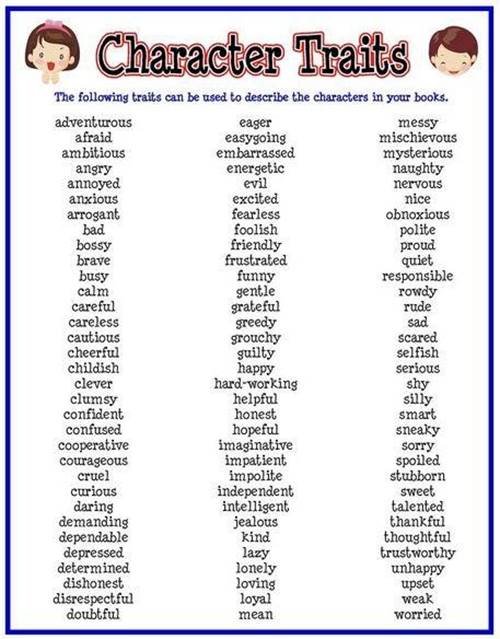
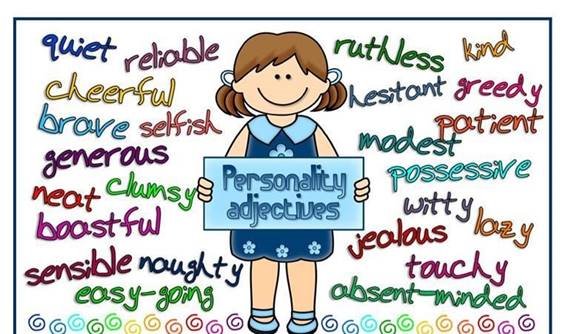
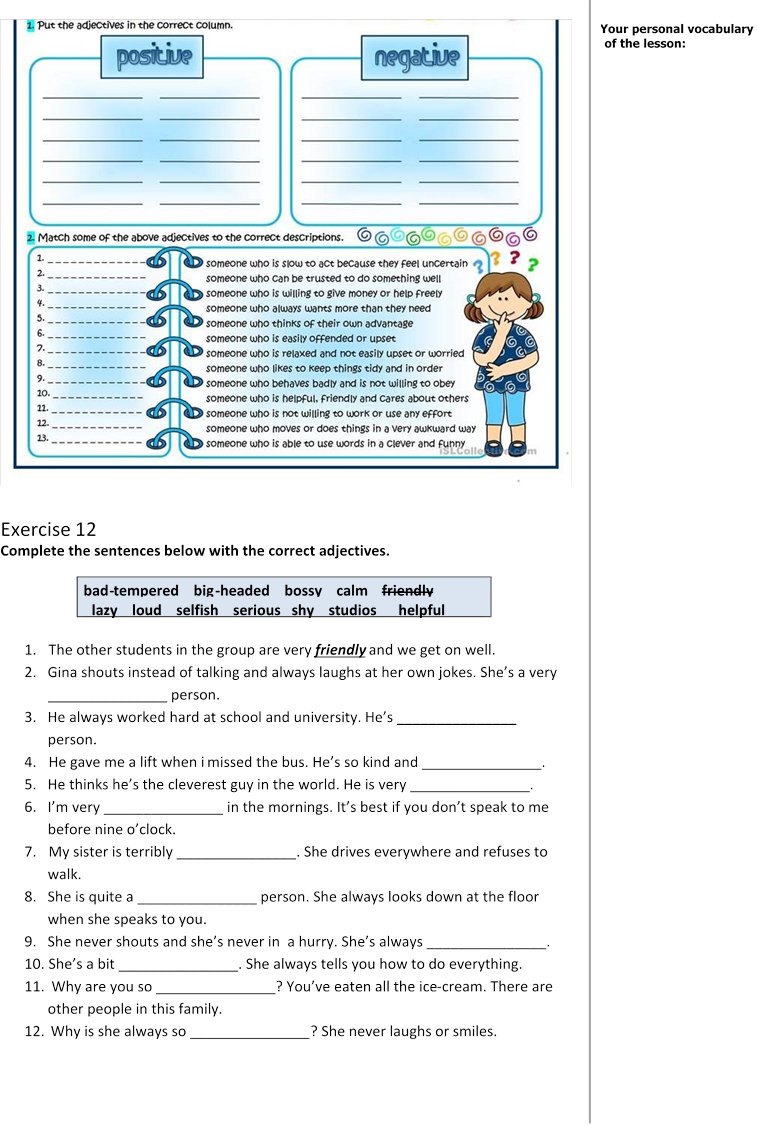 |
Your personal vocabulary Your personal vocabulary
![]() 13 Your personal vocabularyof the
lesson:of the lesson: of the lesson: Write the words in the box
under the correct definitions.
13 Your personal vocabularyof the
lesson:of the lesson: of the lesson: Write the words in the box
under the correct definitions.
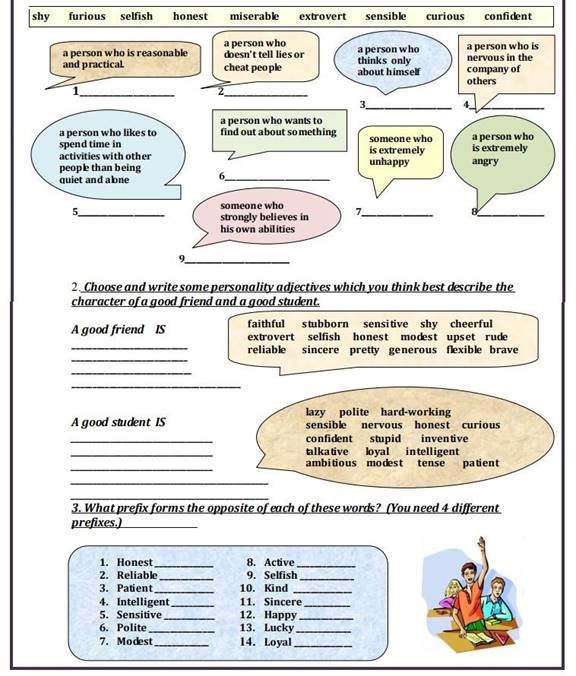
Exercise 14
Describing people: Character
A. Here are twelve adjectives to describe a person’s character. Match them with the correct definition below. Write the numbers 1—12 next to each adjective.
|
beautiful polite generous stupid |
happy handsome intelligent miserable
|
lazy hard-working mean rude |
1 He looks like a film star. Every girl in the office wants to go out with him.
He is very ___________ .
2 She finds it very easy to learn things and has passed all her exams. She is extremely ___________ .
3 She is always buying things for people. She is very ___________. 4 He hates working and would prefer to stay at home all day in front of the television. He is so ___________ .
5 He doesn’t know anything. He can’t even add up two and four.
He is so ___________ .
6 The children next-door are so ___________. They never say ‘Please’ or ‘Thank you’ and always shout back at their parents.
7 He is always smiling and thinks life is wonderful. He seems to be really ___________ .
8 He starts work at 6.00 every day and often works overtime or at weekends. He is really___________ .
9 She works as a model. When she walks into a room every man turns and stares at her. She is really ___________ .
10 He hates spending money and never buys anyone a drink at the pub. He is so ___________ .
11 She always says ‘Please’ and ‘Thank you’. She is a very ___________ child.
12 She never has a smile on her face and always looks unhappy. She is so ___________.
 B. Here are ten more adjectives to
describe a person’s character. Again, match them with the correct definition
below. Write the numbers 1—10 next to each adjective.
B. Here are ten more adjectives to
describe a person’s character. Again, match them with the correct definition
below. Write the numbers 1—10 next to each adjective.
|
Ambitious impatient selfish sociable patient boring jealous shy tidy imaginative |
1. Everything is always in the right place in his room and on his desk.
He is really ___________.
2. She finds it very easy to make up stories to tell her children, and can always think of new ideas. She is so ___________ .
3. He only ever thinks of himself. He is really ___________ .
4. She wants to get a top job one day and even talks about becoming Prime Minister. She is extremely ___________.
5. He hates waiting for people or trains and can’t stand it when things don’t happen immediately. He is very ___________ .
6. He loves going to parties and meeting people. He is very ___________ .
7. The only thing she ever talks about is golf. I almost fell asleep listening to her. She is so ___________ .
8. He never shouts at us and will explain things over and 'over again until we understand them. He is very ___________ .
9. She doesn’t like meeting strange people and usually feels nervous and uncomfortable at parties. She is extremely ___________ .
10. She gets very angry if her husband looks at another woman. She is extremely ___________ .
15Your personal vocabulary
A. In each sentence below put the correct adjective from the group of three of the lesson:
above it.
1. impatient sociable adventurous
(a) She loves meeting people and going to parties. She's a very _______ person.
(b) She likes new things and new places even if they’re difficult or dangerous.
She's _______ .
(c) He gets very annoyed if he has to wait for anything. He doesn't like waiting. He's very _______ .
2. ambitious easy-going talkative
(a) He never gets upset or annoyed when things go wrong.
He’s a very _______ man.
(b) He loves to talk to people and tell them what he thinks and what he‘s done.
He’s _______.
(c) She wants to get an important job in a high position. She's ' _______.
3. lazy naughty cheerful
(a) ![]() Little Rosie is
always breaking things and doing what her mother tells her not to do. She's a
_______ girl.
Little Rosie is
always breaking things and doing what her mother tells her not to do. She's a
_______ girl.
(b) He doesn’t like work. He prefers to do nothing. He's _______ .
(c) He's always happy and smiling. He’s very _______ .
4. sensible selfish optimistic
(a) She only thinks about herself. She doesn't care about other people.
She's _______.
(b) He has a lot of common sense. He always knows the correct thing to do.
He’s a _______ boy.
(c) He always has good hopes for the future. He thinks everything will be fine. He's very _______ .
5. polite imaginative tidy
(a) She’ 5 very careful about her appearance and how she arranges her desk and her room She's a ____young lady.
(b) He always remembers to say ‘please’ and 'thank you. He's very _________ . (c) He has ideas like no one else’s. He can write Wonderful stories, draw unusual pictures and suggest unusual ideas. He's extremely _______ .
B. For each of the 15 adjectives above find in the list below the best adjective which describes the opposite kind of person.
|
a) Impolite b) Hard – working c) Silly d) Pessimistic e) unsociable |
f) sad g) well-behaved h) patient i) quiet j) untidy |
k) bad-tempered l) unambitious m) cautious n) unselfish o) unimaginative |
![]() Exercise 16 Your
personal vocabulary of the lesson:
Exercise 16 Your
personal vocabulary of the lesson:
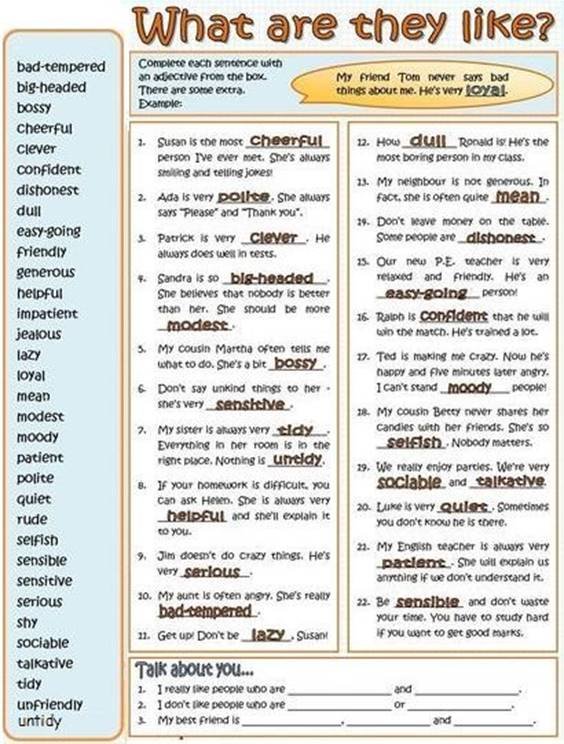
Exercise 17
Match the adjectives and definitions. Underline the stress.
Affectionate co—operative lazy sensible aggressive charming moody sensitive ambitious insecure self—confident jealous
bossy shy selfish sociable
1 She feels very sure of herself. ___________________
2 He only thinks about himself. ___________________
3 She’s always telling other people What to do. ___________________ Your personal vocabularyYour personal vocabulary of the lesson:of the lesson:
4 He’s always ready for a fight. ___________________ 5 She’s good at working with other people. ___________________
6 He likes being with other people. ___________________
7 She wants What another person has. ___________________
8 He’s happy one moment and sad the next. ___________________
9 She’s not sure of herself. ___________________
10 He’s good at making people like him. ___________________
11 She doesn’t like working. ___________________
12 He’s very loving. ___________________
13 She has a lot of common sense. ___________________
14 He feels things quickly and deeply. ___________________ 15 She finds it difficult to talk to new people. ___________________
16 He wants to do well in life. ___________________
 Exercise 18
Exercise 18
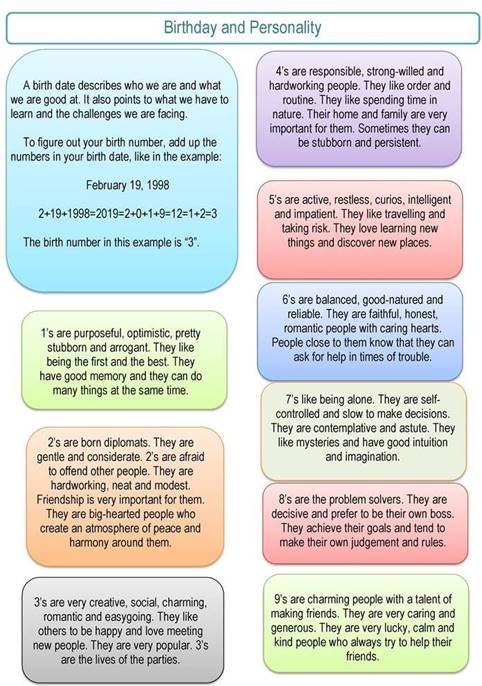
 Exercise 19
Exercise 19
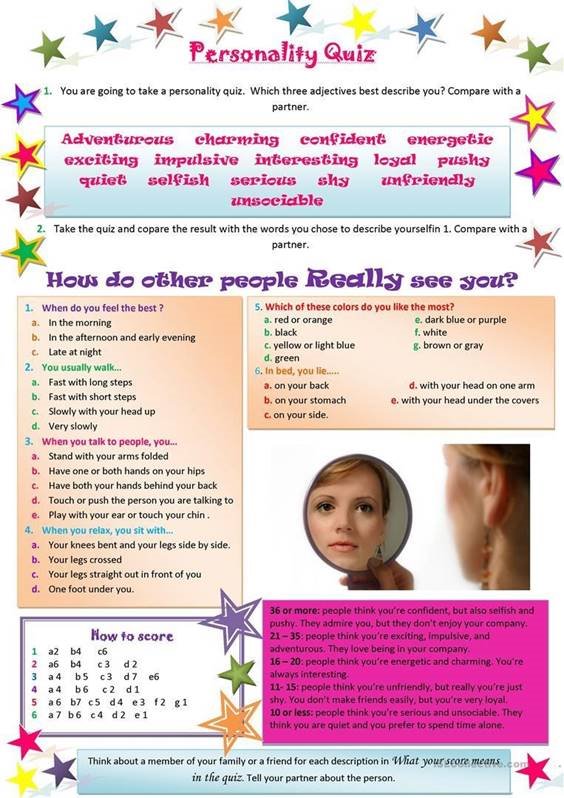
Exercise 20
Read the text and write out the words to the theme “Person’s Character and Appearance”:
Mrs. Forestier was neither charming, beautiful, nor intelligent; on the contrary she was absurd, homely and foolish; yet the more you knew her the more you liked her, and when asked why, you found yourself forced to repeat that she was a very nice woman. She was as tall as the average man; she had a large mouth and a great hooked nose, pale—blue, short-sighted eyes and big ugly hands. Her skin was lined and weatherbeaten, but she was made up heavily, and hair, which she wore long, was died golden, Your personal vocabulary tightly marcelled and elaborately dressed... She spent a great deal of money on her of the lesson:
clothes, which she got from the most fashionable dress— makers in Paris but though a woman of fifty she had an unfortunate taste for choosing dresses that looked exquisite on pretty little mannequins in the flower of their youth. She always wore a great quantity of rich jewels. Her movements were awkward and her gestures clumsy and her gestures clumsy…
…Yet this ungainly exterior sheltered a tender, romantic and idealistic soul.
Exercise 21
A. The diagram below shows some common uses of feel.
![]() Tick (✓)
the phrases you already know. Write (?) next to the ones you are not
sure about.
Tick (✓)
the phrases you already know. Write (?) next to the ones you are not
sure about.
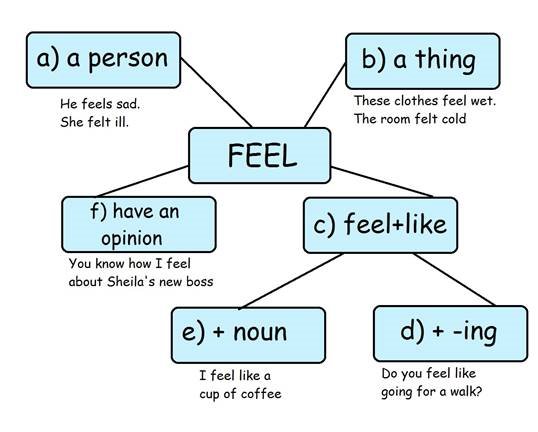
B. Match a sentence from A with a sentence from B.
A
1. How’s your mum today?
2. What do you feel like doing tonight?
3. What time did you go to bed last night?
4. How do you feel about our new boss?
5. Ooh, your hands feel cold!
6. Do you feel like a rest after your journey?
7. How was work?
8. l feel terrible about what I said to Tina.
B
1. Oh. before nine. I felt really tired.
2. Don’t worry - I’m sure she wasn’t upset.
3. No, it's OK, I slept a lot on the plane. Your personal vocabulary of the lesson:
4. Oh, she's feeling much better, thanks.
5. Oh. terrible. Sometimes I feel like walking out.
6. I think he’s OK. He’s got some good ideas.
7. I don’t know what’s on at the cinema?
8. I know - I left my gloves at home.
C. Wordspot feel. Complete the sentences with the correct form of feel and a word or phrase from the box.
![]() about cold embarrassed hot like like doing
sick well
about cold embarrassed hot like like doing
sick well
1. What do you Feel like doing this weekend?
2. Do you ___________ something to eat before we go?
3. This room ___________ who left the window open?
4. Mum, come quicky! Sam says he ___________
5. I ___________ so ___________ when I broke Jose’s glasses.
6. How do you __________ Cam’s plans to move overseas?
7. Your head ____________ , think you’ve got a temperature.
8. Joss went home because she didn't __________ very ___________ .


про публікацію авторської розробки
Додати розробку
